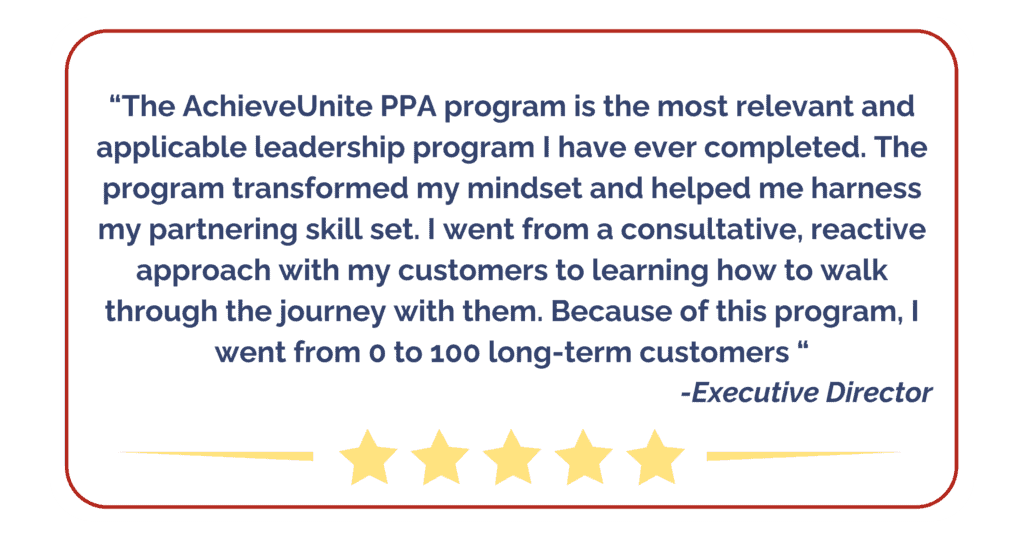Sales roles are evolving rapidly in today’s ever-changing ecosystem of partners. You may have the right partner programs and a great mix of partners, but do your salespeople have the necessary hard and soft skills to take your business to the next level? Throughout my career in field and partner sales to eventually becoming a Channel Chief, I observed that my peers and employees who exceeded their goals all had one thing in common: a growth mindset versus a fixed mindset. Rather than viewing obstacles as failures, they see them as opportunities for learning and growth. But what is a growth mindset and how can it be learned?
What is a Growth Mindset?
The concept of a growth mindset was developed 30 years ago by Dr. Carol Dweck at Stanford University:
After studying the behavior of thousands of children, Dr. Dweck coined the terms fixed mindset and growth mindset to describe the underlying beliefs people have about learning and intelligence. When [people] believe they can get smarter, they understand that effort makes them stronger. Therefore, they put in extra time and effort, and that leads to higher achievement. https://www.mindsetworks.com/science/
People who have a growth mindset believe that even if they struggle with certain skills, their abilities aren’t set in stone. They think that with work, their skills can improve over time. People with the opposite belief — that abilities are what they are and won’t change — have a fixed mindset.
Core Principle of a Growth Mindset:
They came up with core principles for adopting a growth mindset that we at AchieveUnite have learned to translate well to the Partner Account Manager (PAM) role, and most other roles, including executives:
1. Embrace Challenges
Sales are inherently challenging, and partner salespeople often encounter a myriad of obstacles daily. From partner objections to working with direct sales teams, to dealing with contracts, there is always something that needs to be solved. Instead of viewing challenges as setbacks, individuals with a growth mindset see them as chances to learn, adapt, and improve. This approach fosters resilience and a proactive attitude towards problem-solving and new opportunity creation.
2. Learn from Criticism
Whether positive or negative, feedback is a powerful tool for growth. Partner Account Managers with a growth mindset welcome constructive criticism and see it as an opportunity to refine their skills. By understanding that feedback is not a reflection of their worth but rather a guide for improvement, they want to continuously enhance their performance, and they seek feedback and always lean into learning opportunities and authentic conversations.
3. Persistence and Effort
A growth mindset emphasizes the importance of continued effort toward reaching goals. Sales success rarely happens overnight, and Partner Account Managers need to commit to the continuous application of new techniques, learning from peers and seeking out team-building opportunities, and continuous improvement. This mindset encourages individuals to keep refining their strategies, trying new approaches, and putting in the effort required to achieve their goals.
Practical Steps for Adopting a Partnering Trust Growth Mindset
I’ve found that these principles really work and have seen sales teams reach their stretch goals when they adopt them. We also developed some practical steps for adopting a partnering trust growth mindset:
1. Embrace a Learning Culture
Create an environment that values continuous learning. Encourage team members to attend training sessions, workshops, and industry events. Foster a culture where sharing knowledge and experiences is celebrated, and leaders and managers need to foster this culture as well.
2. Set Incremental Goals
Rather than focusing solely on end results, break down larger goals into smaller, achievable milestones. Celebrate when milestones are reached, reinforcing the idea that progress is a continuous journey. Leaders need to coach to milestones and continuously reinforce progress examples with teams as well.
3. Encourage Risk-Taking
Challenge one another and encourage and reward members of your team to step out of their comfort zones. Taking calculated risks can lead to innovation and growth. Encourage experimentation and emphasize that failures are not setbacks but valuable lessons. As leaders, promote risk taking, learning from mistakes, and create brainstorming, win rooms, loss learning sessions and partner strategic planning workshops to foster structure and instill a culture of learning and collaboration. Reward new ideas, creativity, and innovations that produce success.
4. Foster a Supportive Team Culture
Create a team environment based on trust and a safe place where individuals feel comfortable seeking help, sharing insights and collaborating. A collaborative and safe culture promotes the exchange of ideas and collective problem solving and instills a sense of loyalty for members of the team because they know it’s ok to not get everything perfect or right. Risk taking, partnering trust cultures also have higher levels of innovation and productivity according to several new studies from HBR.
Adopting a Partnering Trust Growth Mindset can be a powerful asset for you and your team, enabling everyone to navigate challenges with trust, resilience, and an openness to learning. If your partner sales team needs a trust and growth mindset boost, AchieveUnite offers our Partner Performance Advisor program, which incorporates these principles. This PAM/CAM focused program consists of an experience designed to level set partner sales knowledge and skill, and then apply these skills in real life scenarios with management and leadership support. Our clients and participants share amazing things about this program and the impact; please reach out to me if you have any questions or would like to learn more.


